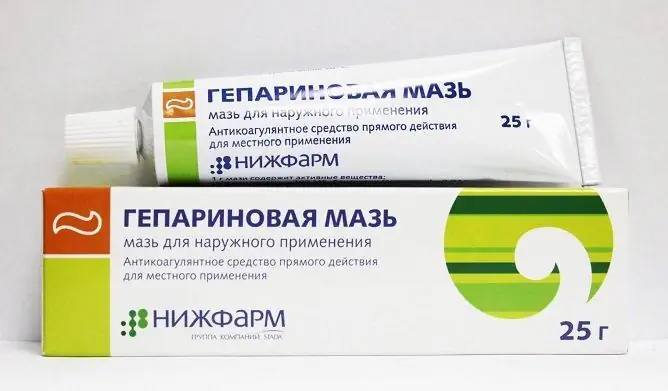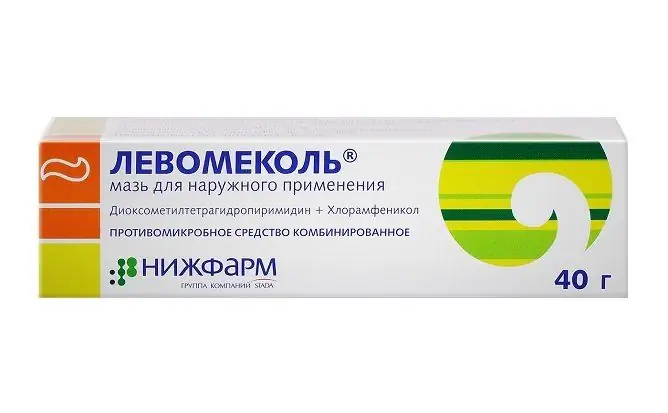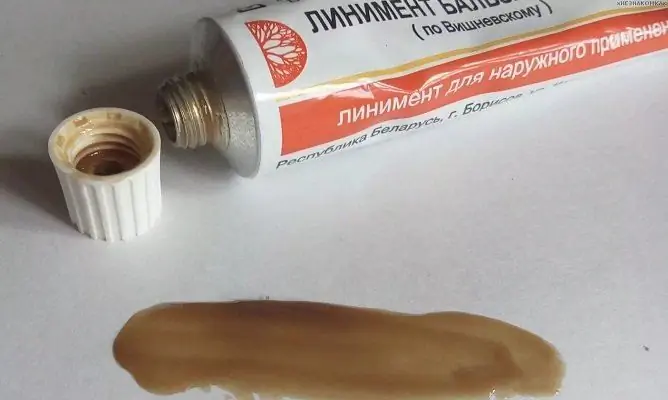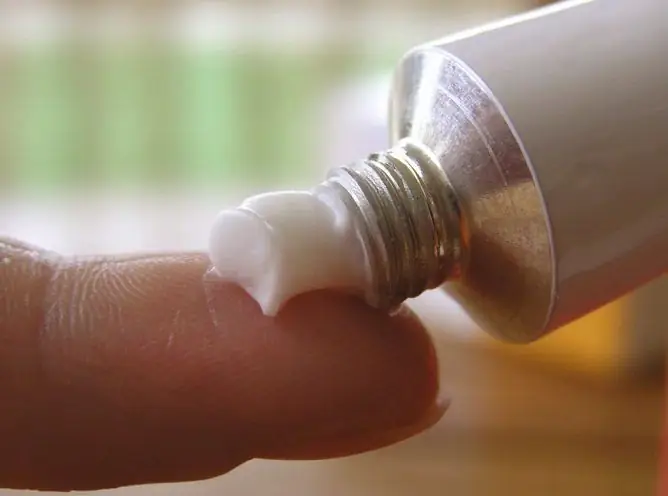- Author Rachel Wainwright wainwright@abchealthonline.com.
- Public 2023-12-15 07:39.
- Last modified 2025-11-02 20:14.
Synthomycin liniment
Synthomycin liniment: instructions for use and reviews
- 1. Release form and composition
- 2. Pharmacological properties
- 3. Indications for use
- 4. Contraindications
- 5. Method of application and dosage
- 6. Side effects
- 7. Overdose
- 8. Special instructions
- 9. Application during pregnancy and lactation
- 10. Use in childhood
- 11. In case of impaired renal function
- 12. For violations of liver function
- 13. Drug interactions
- 14. Analogs
- 15. Terms and conditions of storage
- 16. Terms of dispensing from pharmacies
- 17. Reviews
- 18. Price in pharmacies
Latin name: Synthomycin liniment
ATX code: D06AX02
Active ingredient: D, L-Chloramphenicol (D, L-Chloramphenicol)
Manufacturer: CJSC Altayvitaminy (Russia); ZAO Zelenaya Dubrava (Russia)
Description and photo updated: 2019-26-12
Prices in pharmacies: from 71 rubles.
Buy

Synthomycin liniment is an antibacterial drug for external use with a wide spectrum of bacteriostatic action.
Release form and composition
The drug is produced in the form of a 10% liniment: a liquid ointment of white or white with a yellow tinge, has a characteristic weak odor (25 g each in glass jars or aluminum tubes with buds, in a cardboard box 1 can or tube and instructions for use Syntomycin liniment) …
100 g of liniment contains:
- active substance: D, L-chloramphenicol (synthomycin) - 10 g;
- auxiliary components: castor oil, sodium carmellose, sorbic acid, emulsifier No. 1, purified water.
Pharmacological properties
Pharmacodynamics
Synthomycin liniment is an antibacterial drug for external use. Its active substance, D, L-chloramphenicol, is the left and dextrorotatory isomer of chloramphenicol. The mechanism of action of liniment is due to its good lipophilicity, which allows it to penetrate the bacterial cell membrane and reversibly bind to the 50S subunit of bacterial ribosomes. This causes a delay in the movement of amino acids to the growing peptide chains and leads to disruption of synthesis in the microbial cell.
Most strains of gram-positive and gram-negative microorganisms are sensitive to the drug, including bacteria resistant to penicillin, tetracyclines or sulfonamides. External use of liniment helps to accelerate the processes of cleansing and healing of trophic ulcers and burn purulent wounds, potentiates epithelization.
Indications for use
The use of Synthomycin liniment 10% is indicated for the treatment of infected wounds caused by sensitive microorganisms, in the 2nd phase of the wound process not complicated by the presence of pus or necrotic tissues, including II-III degree burns and long-term non-healing trophic ulcers.
Contraindications
Absolute:
- oppression of bone marrow hematopoiesis;
- hepatic and / or renal failure;
- acute intermittent porphyria;
- psoriasis, eczema, fungal skin diseases;
- 1st phase of the wound process;
- deficiency of gluco-6-phosphate dehydrogenase;
- age up to 4 weeks (neonatal period);
- hypersensitivity to liniment components.
Synthomycin liniment should be used with caution in early childhood, pregnancy and lactation, in patients who have previously undergone radiation therapy or treatment with cytostatic agents.
Synthomycin liniment, instructions for use: method and dosage
Ointment Synthomycin liniment is applied externally (after surgical treatment of the wound surface) by applying directly to wounds and burns or to dressing material, which is then applied to the wound. In the presence of purulent wounds, their cavities are loosely filled with tampons impregnated with liniment; in the treatment of trophic ulcers, gauze turundas with the drug are injected into the fistulous passages. Cover the top with a sterile gauze bandage.
Recommended dosage: 1 time within 24-72 hours.
The frequency of the procedures depends on the dynamics of the healing process.
Side effects
- from the immune system: allergic reactions (including skin rash, angioedema);
- on the part of the hematopoietic organs: rarely - leukopenia, erythropenia, reticulocytopenia, thrombocytopenia, granulocytosis, granulocytopenia, aplastic anemia.
Overdose
Symptoms of an overdose of synthomycin for external use have not been established.
special instructions
It should be borne in mind that the 1st phase of the wound process is characterized by abundant suppuration, the presence of necrotic tissues, pronounced tissue edema, pain syndrome.
When liniment is applied externally, there is no information on the dependence of the effect of the drug on the patient's age.
Influence on the ability to drive vehicles and complex mechanisms
The use of Synthomycin liniment ointment does not affect the patient's ability to drive vehicles or complex mechanisms.
Application during pregnancy and lactation
When using Synthomycin liniment during pregnancy or breastfeeding, the negative effect of the drug on the fetus or child has not been revealed, however, it is recommended to be careful.
Pediatric use
The use of Syntomycin liniment for the treatment of infants under 4 weeks of age is contraindicated.
With impaired renal function
The use of Syntomycin liniment is contraindicated in renal failure.
For violations of liver function
The use of Syntomycin liniment is contraindicated in hepatic insufficiency.
Drug interactions
Mutual influence of Synthomycin liniment and simultaneously used drugs / substances:
- erythromycin, clindamycin, lincomycin: the combination with these agents is accompanied by a mutual weakening of the clinical effect, since chloramphenicol is able to displace them from the bound state or to resist their binding to the 50S subunit of the ribosomes of bacteria;
- penicillins, cephalosporins: it should be borne in mind that their antibacterial effect is reduced under the influence of chloramphenicol.
Analogs
Analogues of Syntomycin liniment are Levomycetin liniment, Levomycetin, Genodex, Iruksol, Candibiotic, Levomekol, Kartomycene, Olazol, Levosin, Levomikon-TFF, Metrolavin, Salesept, etc.
Terms and conditions of storage
Keep out of the reach of children.
Store at temperatures up to 15 ° C, protected from moisture and light.
Shelf life is 2 years.
Terms of dispensing from pharmacies
Available without a prescription.
Reviews of Syntomycin liniment
Reviews of Syntomycin liniment are positive. Patients point to the high efficacy of the drug in the treatment of purulent wounds, including burns and boils. After being applied to the affected area, synthomycin quickly acts, drawing out pus and stopping inflammation, accelerates epithelization. Some users report that liniment helps them get rid of acne safely. In addition, the advantages of the drug include the absence of odor, a non-greasy structure, an optimal consistency, which ensures a fairly quick absorption and an affordable cost.
The price of Syntomycin liniment in pharmacies
The price of Sintomycin liniment 10% for a tube of 25 g can be about 115 rubles.
Synthomycin liniment: prices in online pharmacies
|
Drug name Price Pharmacy |
|
Synthomycin liniment 10% 25g RUB 71 Buy |

Maria Kulkes Medical journalist About the author
Education: First Moscow State Medical University named after I. M. Sechenov, specialty "General Medicine".
Information about the drug is generalized, provided for informational purposes only and does not replace the official instructions. Self-medication is hazardous to health!






